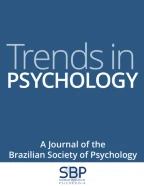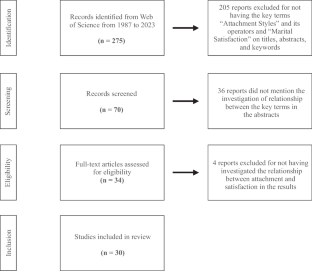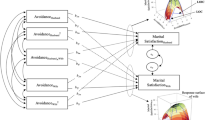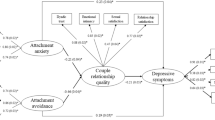A Systematic Review of the Relationship Between Marital Satisfaction and Adult’s Attachment Styles: an Evolutionary and Cross-Cultural Perspective

The subjective experience of satisfaction with a romantic relationship is commonly associated with the individual characteristics of couples and the cultures in which they live. One of the most studied individual characteristics is the adult attachment style, comprising the particular functioning by which the individual seeks trust, intimacy, and closeness in romantic relationships. Although many studies point out that secure attachment is associated with greater satisfaction, it is not clear how generalizable this association is since different individuals, contexts, and cultures can modulate this relationship. Therefore, we aimed to conduct a systematic review of the relationship between adult attachment and marital satisfaction. We followed the PRISMA method guidelines, using the terms “Attachment Styles” and “Marital Satisfaction” using the Web of Science database (Fig. 1). From a total of 275 articles, 30 studies were included in the review. Twenty-three studies (~ 80%) found a positive association between partner satisfaction and their spouse’s secure attachment and/or a negative association between partner satisfaction with their spouse’s insecure style. However, six studies indicated a contrary relationship, in which satisfaction was positively associated with insecure attachment, while six found no relationship between satisfaction and any attachment styles. Interestingly, nine studies found an association between self-reported insecure attachment and lower satisfaction in the same individuals. In addition, the birth of a child resulted in mixed results for couples, with positive and negative associations found between avoidant attachment and satisfaction. Finally, the positive association between satisfaction and secure attachment was found consistently in western and eastern cultures. Thus, the relationship between secure attachment style and love satisfaction presents a high degree of generality across cultures sampled in this review. However, the limitation in the number of cultures included in this review prevents drawing definitive conclusions. In addition, more research is needed to understand the functioning of attachment styles on marital satisfaction as couples are inserted in and go through different contexts. We consider that a cross-cultural perspective is necessary for studies on attachment styles and satisfaction, especially for studies with an evolutionary viewpoint, to understand the relationship between universal characteristics and the inherent diversity of human psychology.
This is a preview of subscription content, log in via an institution to check access.
Access this article
Subscribe and save
Springer+ Basic
€32.70 /Month
- Get 10 units per month
- Download Article/Chapter or eBook
- 1 Unit = 1 Article or 1 Chapter
- Cancel anytime
Buy Now
Price includes VAT (France)
Instant access to the full article PDF.
Rent this article via DeepDyve

Similar content being viewed by others

Surface of Marital Harmony: Insights into Attachment Similarity Using Dyadic Response Surface Analysis
Article 20 August 2024

Are we okay…Am I okay? Romantic attachment, couple relationship quality and depressive symptoms in a Chilean sample
Article 18 June 2024

Couple’s Satisfaction among Lebanese adults: validation of the Toronto Alexithymia Scale and Couple Satisfaction Index-4 scales, association with attachment styles and mediating role of alexithymia
Article Open access 19 January 2022
Notes
The study’s authors also included the factors of dominance, submission, and popularity of the Sternberg Love Story Index in their regression analyses (Sina et al., 2018).
References
- Abbasi, A. R. K., Tabatabaei, S. M., Sharbaf, H. A., & Karshki, H. (2016). Relationship of attachment styles and emotional intelligence with marital satisfaction. Iranian Journal of Psychiatry and Behavioral Sciences, 10(3). https://doi.org/10.17795/ijpbs-2778
- Ainsworth, M. D. S., Blehar, M., Waters, E., & Wall, S. (Eds.). (1978). Patterns of attachment: A psychological study of the strange situation (digital print). Psychology Press. Google Scholar
- Alexandrov, E. O., Cowan, P. A., & Cowan, C. P. (2005). Couple attachment and the quality of marital relationships: Method and concept in the validation of the new couple attachment interview and coding system. Attachment & Human Development, 7(2), 123–152. https://doi.org/10.1080/14616730500155170ArticleGoogle Scholar
- American Psychological Association. (2001). ‘Journals of the century’, by category. APA website. Retrieved January 05, 2023, from https://www.apa.org/monitor/nov01/journals
- Andrade, T. A., Sampaio, M. A., & Donard, V. (2022). Applying digital technologies to tackle teen dating violence: A systematic review. Trends in Psychology.https://doi.org/10.1007/s43076-022-00180-9
- Apicella, C. L., & Barrett, H. C. (2016). Cross-cultural evolutionary psychology. Current Opinion in Psychology, 7, 92–97. https://doi.org/10.1016/j.copsyc.2015.08.015ArticleGoogle Scholar
- Banse, R. (2004). Adult attachment and marital satisfaction: Evidence for dyadic configuration effects. Journal of Social and Personal Relationships, 21(2), 273–282. https://doi.org/10.1177/0265407504041388ArticleGoogle Scholar
- Barbaro, N., Sela, Y., Atari, M., Shackelford, T. K., & Zeigler-Hill, V. (2019). Romantic attachment and mate retention behavior: The mediating role of perceived risk of partner infidelity. Journal of Social and Personal Relationships, 36(3), 940–956. https://doi.org/10.1177/0265407517749330ArticleGoogle Scholar
- Barrett, H. C. (2020). Deciding what to observe: Thoughts for a post-WEIRD generation. Evolution and Human Behavior, 41(5), 445–453. https://doi.org/10.1016/j.evolhumbehav.2020.05.006ArticleGoogle Scholar
- Bartholomew, K., & Horowitz, L. M. (1991). Attachment styles among young adults: A test of a four-category model. Journal of Personality and Social Psychology, 61(2), 226–244. https://doi.org/10.1037/0022-3514.61.2.226ArticlePubMedGoogle Scholar
- Bedair, K., Hamza, E., & Gladding, S. (2020). Attachment style, marital satisfaction, and mutual support attachment style in Qatar. Family Journal, 28(3), 329–336. https://doi.org/10.1177/1066480720934377ArticleGoogle Scholar
- Belsky, J. (1997). Attachment, mating, and parenting. Human Nature, 8(4), 361–381. https://doi.org/10.1007/BF02913039ArticlePubMedGoogle Scholar
- Benson, L. A., Sevier, M., & Christensen, A. (2013). The impact of behavioral couple therapy on attachment in distressed couples. Journal of Marital and Family Therapy, 39(4), 407–420. https://doi.org/10.1111/jmft.12020ArticlePubMedPubMed CentralGoogle Scholar
- Bernier, A., & Matte-Gagné, C. (2011). More bridges: Investigating the relevance of self- report and interview measures of adult attachment for marital and caregiving relationships. International Journal of Behavioral Development, 35(4), 307–316. https://doi.org/10.1177/0165025410396766ArticleGoogle Scholar
- Bowlby, J. (1999). Attachment and loss (2nd ed). Basic Books. Google Scholar
- Buss, D. M., & Schmitt, D. P. (1993). Sexual strategies theory: An evolutionary perspective on human mating. Psychological Review, 100(2), 204–232. https://doi.org/10.1037/0033-295X.100.2.204ArticlePubMedGoogle Scholar
- Buss, D. M., & Schmitt, D. P. (2019). Mate preferences and their behavioral manifestations. Annual Review of Psychology, 70(1), 77–110. https://doi.org/10.1146/annurev-psych-010418-103408ArticlePubMedGoogle Scholar
- Castellano, R., Velotti, P., Crowell, J. A., & Zavattini, G. C. (2014). The role of parents’ attachment configurations at childbirth on marital satisfaction and conflict strategies. Journal of Child and Family Studies, 23(6), 1011–1026. https://doi.org/10.1007/s10826-013-9757-7ArticleGoogle Scholar
- Chapais, B. (2016). Psychological adaptations and the production of culturally polymorphic social universals. Evolutionary Behavioral Sciences, 11(1), 63. https://doi.org/10.1037/ebs0000079ArticleGoogle Scholar
- Chung, M.-S. (2014). Pathways between attachment and marital satisfaction: The mediating roles of rumination, empathy, and forgiveness. Personality and Individual Differences, 70, 246–251. https://doi.org/10.1016/j.paid.2014.06.032ArticleGoogle Scholar
- Cohen, J. (2001). APA publishes 13 of the century’s top 28 psychology journals. https://www.apa.org/monitor/nov01/topjournals
- Collins, N. L. (1996). Working models of attachment: Implications for explanation, emotion, and behavior. Journal of Personality and Social Psychology, 71(4), 810–832. ArticlePubMedGoogle Scholar
- Collins, N. L., & Read, S. J. (1990). Adult attachment, working models, and relationship quality in dating couples. Journal of Personality and Social Psychology, 58(4), 644–663. ArticlePubMedGoogle Scholar
- Consoli, N., Wagner Bernardes, J., & Marin, A. H. (2018). Laços de afeto: as repercussões do estilo de apego primário e estabelecido entre casais no ajustamento conjugal. Avances En Psicología Latinoamericana, 36(2), 315. https://doi.org/10.12804/revistas.urosario.edu.co/apl/a.5409ArticleGoogle Scholar
- Davila, J., & Bradbury, T. N. (2001). Attachment insecurity and the distinction between unhappy spouses who do and do not divorce. Journal of Family Psychology, 15(3), 371–393. https://doi.org/10.1037/0893-3200.15.3.371ArticlePubMedGoogle Scholar
- Dekkers, O. M., Vandenbroucke, J. P., Cevallos, M., Renehan, A. G., Altman, D. G., & Egger, M. (2019). COSMOS-E: Guidance on conducting systematic reviews and meta-analyses of observational studies of etiology. PLOS Medicine, 16(2), e1002742. https://doi.org/10.1371/journal.pmed.1002742ArticlePubMedPubMed CentralGoogle Scholar
- Del Giudice, M. (2009). Sex, attachment, and the development of reproductive strategies. Behavioral and Brain Sciences, 32(1), 1–21. https://doi.org/10.1017/S0140525X09000016ArticlePubMedGoogle Scholar
- Del Giudice, M. (2019). Sex differences in attachment styles. Current Opinion in Psychology, 25, 1–5. https://doi.org/10.1016/j.copsyc.2018.02.004ArticlePubMedGoogle Scholar
- Ein-Dor, T. (2014). Facing danger: How do people behave in times of need? The case of adult attachment styles. Frontiers in Psychology, 5, 1452. https://doi.org/10.3389/fpsyg.2014.01452ArticlePubMedPubMed CentralGoogle Scholar
- Ein-Dor, T., Mikulincer, M., Doron, G., & Shaver, P. R. (2010). The attachment paradox. Perspectives on Psychological Science, 5(2), 123–141. https://doi.org/10.1177/1745691610362349ArticlePubMedGoogle Scholar
- Ellis, B. J., & Del Giudice, M. (2019). Developmental adaptation to stress: An evolutionary perspective. Annual Review of Psychology, 70, 111–139. https://doi.org/10.1146/annurev-psych-122216-011732ArticlePubMedGoogle Scholar
- Feeney, J. A. (1999). Adult attachment, emotional control, and marital satisfaction. Personal Relationships, 6(2), 169–185. https://doi.org/10.1111/j.1475-6811.1999.tb00185.xArticleGoogle Scholar
- Feeney, J. A. (2002). Attachment, marital interaction, and relationship satisfaction: A diary study. Personal Relationships, 9(1), 39–55. https://doi.org/10.1111/1475-6811.00003ArticleGoogle Scholar
- Feeney, J. A., & Noller, P. (1990). Attachment style as a predictor of adult romantic relationships. Journal of personality and Social Psychology, 58(2), 281. https://doi.org/10.1037/0022-3514.58.2.281ArticleGoogle Scholar
- Fraley, R. C., & Roisman, G. I. (2019). The development of adult attachment styles: Four lessons. Current Opinion in Psychology, 25, 26–30. https://doi.org/10.1016/j.copsyc.2018.02.008ArticlePubMedGoogle Scholar
- Fraley, R. C., & Shaver, P. R. (2000). Adult romantic attachment: Theoretical developments, emerging controversies, and unanswered questions. Review of General Psychology, 4(2), 132–154. https://doi.org/10.1037/1089-2680.4.2.132ArticleGoogle Scholar
- Friedman, M., Rholes, W. S., Simpson, J., Bond, M., Diaz-Loving, R., & Chan, C. (2010). Attachment avoidance and the cultural fit hypothesis: A cross-cultural investigation. Personal Relationships, 17(1), 107–126. https://doi.org/10.1111/j.1475-6811.2010.01256.xArticleGoogle Scholar
- Gomes, I. S., & de Oliveira Caminha, I. (2014). Guia para estudos de revisão sistemática: uma opção metodológica para as Ciências do Movimento Humano. Movimento (ESEFID/UFRGS), 20(1), 395–411. https://doi.org/10.22456/1982-8918.41542ArticleGoogle Scholar
- Griffin, D. W., & Bartholomew, K. (1994). Models of the self and other: Fundamental dimensions underlying measures of adult attachment. Journal of Personality and Social Psychology,67(3), 430–445. https://doi.org/10.1037/0022-3514.67.3.430ArticleGoogle Scholar
- Harma, M., & Sümer, N. (2016). Are avoidant wives and anxious husbands unhappy in a collectivist context? Dyadic associations in established marriages. Journal of Family Studies, 22(1), 63–79. https://doi.org/10.1080/13229400.2015.1024711ArticleGoogle Scholar
- Hazan, C., & Shaver, P. (1987). Romantic love conceptualized as an attachment process. Journal of Personality and Social Psychology, 52(3), 511–524. https://doi.org/10.1037/0022-3514.52.3.511ArticlePubMedGoogle Scholar
- He, S., & Tsang, S. (2017). Perceived female infidelity and male sexual coercion concerning first sex in Chinese college students’ dating relationships: The mediating role of male partners’ attachment insecurity. Personality and Individual Differences, 111, 146–152. https://doi.org/10.1016/j.paid.2017.02.016ArticleGoogle Scholar
- Hendrick, S. S., Hendrick, C., & Adler, N. L. (1988). Romantic relationships: Love, satisfaction, and staying together. Journal of Personality and Social Psychology, 54(6), 980. https://doi.org/10.1037/0022-3514.54.6.980ArticleGoogle Scholar
- Henrich, J., Heine, S. J., & Norenzayan, A. (2010). Most people are not WEIRD. Nature, 466(7302), 29–29. https://doi.org/10.1038/466029aArticlePubMedGoogle Scholar
- Hirschberger, G., Srivastava, S., Marsh, P., Cowan, C. P., & Cowan, P. A. (2009). Attachment, marital satisfaction, and divorce during the first fifteen years of parenthood. Personal Relationships, 16(3), 401–420. https://doi.org/10.1111/j.1475-6811.2009.01230.xArticlePubMedPubMed CentralGoogle Scholar
- Huang, C.-Y., Sirikantraporn, S., Pichayayothin, N. B., & Turner-Cobb, J. M. (2020). Parental attachment, adult-child romantic attachment, and marital satisfaction: An examination of cultural context in Taiwanese and Thai heterosexual couples. International Journal of Environmental Research and Public Health, 17(3), 692. https://doi.org/10.3390/ijerph17030692ArticlePubMedPubMed CentralGoogle Scholar
- Jarnecke, A. M., & South, S. C. (2013). Attachment orientations as mediators in the intergenerational transmission of marital satisfaction. Journal of Family Psychology, 27(4), 550–559. https://doi.org/10.1037/a0033340ArticlePubMedGoogle Scholar
- Kahalon, R., Klein, V., Ksenofontov, I., Ullrich, J., & Wright, S. C. (2022). Mentioning the sample’s country in the article’s title leads to bias in research evaluation. Social Psychological and Personality Science, 13(2), 352–361. https://doi.org/10.1177/19485506211024036ArticleGoogle Scholar
- Kohn, J. L., Rholes, S. W., Simpson, J. A., Martin, A. M., Tran, S., & Wilson, C. L. (2012). Changes in marital satisfaction across the transition to parenthood. Personality and Social Psychology Bulletin, 38(11), 1506–1522. https://doi.org/10.1177/0146167212454548ArticlePubMedGoogle Scholar
- Li, X., Curran, M., LeBaron-Black, A., Jorgensen, B., Yorgason, J., & Wilmarth, M. (2021). Couple-level attachment styles, finances, and marital satisfaction: Mediational analyses among young adult newlywed couples. Journal of Family and Economic Issues., 44, 125–142. https://doi.org/10.1007/s10834-021-09808-xArticleGoogle Scholar
- Lucas, T., Parkhill, M. R., Wendorf, C. A., Olcay Imamoglu, E., Weisfeld, C. C., Weisfeld, G. E., & Shen, J. (2008). Cultural and evolutionary components of marital satisfaction: A multidimensional assessment of measurement invariance. Journal of Cross-Cultural Psychology, 39(1), 109–123. https://doi.org/10.1177/0022022107311969ArticleGoogle Scholar
- Mardani, M., Marashi, S., & Abbaspour, Z. (2021). On the causal relationship between attachment styles and marital satisfaction: Mediating role of Gottman’s marital communication model. Iranian Journal of Psychiatry and Behavioral Sciences, 15(2). https://doi.org/10.5812/ijpbs.108339
- Meyers, S. A., & Landsberger, S. A. (2002). Direct and indirect pathways between adult attachment style and marital satisfaction. Personal Relationships, 9(2), 159–172. https://doi.org/10.1111/1475-6811.00010ArticleGoogle Scholar
- Milad, E. H., Ottenberger, D. R., & Artigas, D. H. (2014). Associations among attachment, sexuality, and marital satisfaction in adult Chilean couples: A linear hierarchical models analysis. Journal of sex & Marital therapy, 40(4), 259–274. https://doi.org/10.1080/0092623X.2012.756840ArticleGoogle Scholar
- Mohammadi, K., Samavi, A., & Ghazavi, Z. (2016). The relationship between attachment styles and lifestyle with marital satisfaction. Iranian Red Crescent Medical Journal, 18(4), e23839. https://doi.org/10.5812/ircmj.23839ArticlePubMedPubMed CentralGoogle Scholar
- Mohd Hasim, M. J., Hashim, N. H., & Mustafa, H. (2021). Married life: Measuring adult romantic attachment and satisfaction. Couple and Family Psychology: Research and Practice, 12(3), 119–131. https://doi.org/10.1037/cfp0000188ArticleGoogle Scholar
- Möller, K., Philip Hwang, C., & Wickberg, B. (2006). Romantic attachment, parenthood and marital satisfaction. Journal of Reproductive and Infant Psychology, 24(3), 233–240. https://doi.org/10.1080/02646830600821272ArticleGoogle Scholar
- Muetzelfeld, H., Megale, A., & Friedlander, M. (2020). Problematic domains of romantic relationships as a function of attachment insecurity and gender. Australian and New Zealand Journal of Family Therapy, 41(1), 80–90. https://doi.org/10.1002/anzf.1401ArticleGoogle Scholar
- Nadiri, M., & Khalatbari, J. (2018). Study of marital satisfaction in students based on psychological components of attachment style, perfectionism and conflict resolution. BRAIN: Broad Research in Artificial Intelligence & Neuroscience, 9(3), 120–127. Google Scholar
- Natividade, J. C., & Shiramizu, V. K. M. (2015). Uma medida de apego: versão brasileira da Experiences in Close Relationship Scale - Reduzida (ECR-R-Brasil). Psicologia USP, 26(3), 484–494. https://doi.org/10.1590/0103-656420140086ArticleGoogle Scholar
- Ng, K. M., Loy, J. T., Mohd Zain, Z., & Cheong, W. (2013). Gender, race, adult attachment, and marital satisfaction among Malaysians. The Family Journal, 21(2), 198–207. https://doi.org/10.1177/1066480712468268ArticleGoogle Scholar
- Nielsen, M., Haun, D., Kärtner, J., & Legare, C. H. (2017). The persistent sampling bias in developmental psychology: A call to action. Journal of Experimental Child Psychology, 162, 31–38. https://doi.org/10.1016/j.jecp.2017.04.017ArticlePubMedGoogle Scholar
- Norenzayan, A., & Heine, S. J. (2005). Psychological universals: What are they and how can we know? Psychological Bulletin, 131(5), 763. https://doi.org/10.1037/0033-2909.131.5.763ArticlePubMedGoogle Scholar
- Page, M. J., JE, M. K., Bossuyt, P. M., Boutron, I., Hoffmann, T. C., Mulrow, C. D., Shamseer, L., Tetzlaff, J. M., Akl, E. A., Brennan, S. E., & Chou, R. (2021). The PRISMA 2020 statement: An updated guideline for reporting systematic reviews. BMJ, 88, 105906. https://doi.org/10.1136/bmj.n71ArticleGoogle Scholar
- Pollet, T. V., & Saxton, T. K. (2019). How diverse are the samples used in the journals ‘evolution & human behavior’ and ‘evolutionary psychology’? Evolutionary Psychological Science, 5(3), 357–368. https://doi.org/10.1007/s40806-019-00192-2ArticleGoogle Scholar
- Rebello, K., Silva Junior, M. D., & Brito, R. C. S. (2014). Fundamental factors in marital satisfaction: An assessment of Brazilian couples. Psychology, 5(7), 777–784. https://doi.org/10.4236/psych.2014.57088ArticleGoogle Scholar
- Rholes, W. S., Simpson, J. A., Campbell, L., & Grich, J. (2001). Adult attachment and the transition to parenthood. Journal of Personality and Social Psychology, 81(3), 421–435. https://doi.org/10.1037/0022-3514.81.3.421ArticlePubMedGoogle Scholar
- Schmitt, D. (2008). Evolutionary perspectives on romantic attachment and culture: How ecological stressors influence dismissing orientations across genders and geographies. Cross-Cultural Research, 42(3), 220–247. https://doi.org/10.1177/1069397108317485ArticleGoogle Scholar
- Schmitt, D. P., Alcalay, L., Allensworth, M., Allik, J., Ault, L., Austers, I., Bennett, K. L., Bianchi, G., Boholst, F., Cunen, M. A., & Braeckman, J. (2004). Patterns and universals of adult romantic attachment across 62 cultural regions: Are models of self and of other pancultural constructs? Journal of Cross-Cultural Psychology, 35(4), 367–402. https://doi.org/10.1177/0022022104266105ArticleGoogle Scholar
- Scorsolini-Comin, F., & Santos, M. A. (2010). Satisfação conjugal: revisão integrativa da literatura científica nacional. Psicologia: Teoria e Pesquisa, 26(3), 525–532. https://doi.org/10.1590/S0102-37722010000300015ArticleGoogle Scholar
- Shackelford, T. K., & Buss, D. M. (1997). Marital satisfaction in evolutionary psychological perspective. Satisfaction in close relationships, 7-25. In R. J. Sternberg & M. Hojjat (Eds.), Satisfaction in close relationships (pp. 7–25). The Guildford Press. Google Scholar
- Shaker, A., Heshmati, R., & Rahimi, M. P. (2010). Investigation of marital adjustment in people with secure, preoccupied, dismissing and fearful attachment styles. Procedia - Social and Behavioral Sciences, 5, 1823–1826. https://doi.org/10.1016/j.sbspro.2010.07.371ArticleGoogle Scholar
- Simpson, J. A., Rholes, W. S., Eller, J., & Paetzold, R. L. (2022). Major principles of attachment theory: Overview, hypotheses, and research ideas (3rd ed.). Guilford Press. Google Scholar
- Sina, F., Najarpourian, S., & Samavi, S. A. (2018). The prediction of marital satisfaction through attachment styles and love story. Iranian Journal of Psychiatry and Behavioral Sciences, 12(4). https://doi.org/10.5812/ijpbs.62774
- Sohrabi, R., Aghapour, M., & Rostami, H. (2013). Inclination to forgiveness and marital satisfaction regarding to mediator attachment styles’ role. Procedia - Social and Behavioral Sciences, 84, 1622–1624. https://doi.org/10.1016/j.sbspro.2013.07.002ArticleGoogle Scholar
- Sugiyama, L. S., Tooby, J., & Cosmides, L. (2002). Cross-cultural evidence of cognitive adaptations for social exchange among the Shiwiar of Ecuadorian Amazonia. Proceedings of the National Academy of Sciences, 99(17), 11537–11542. https://doi.org/10.1073/pnas.122352999ArticleGoogle Scholar
- Teixeira, R. C. R., Ferreira, J. H. B. P., & Howat-Rodrigues, A. B. C. (2019). Collins and read revised adult attachment scale (RAAS) validity evidences. Psico, 50(2), e29567–e29567. https://doi.org/10.15448/1980-8623.2019.2.29567ArticleGoogle Scholar
- Thompson, R. A., Simpson, J. A., & Berlin, L. J. (2022). Taking perspective on attachment theory and research: Nine fundamental questions. Attachment & Human Development, 24(5), 543–560. https://doi.org/10.1080/14616734.2022.2030132ArticleGoogle Scholar
- Timm, T. M., & Keiley, M. K. (2011). The effects of differentiation of self, adult attachment, and sexual communication on sexual and marital satisfaction: A path analysis. Journal of Sex & Marital Therapy, 37(3), 206–223. https://doi.org/10.1080/0092623X.2011.564513ArticleGoogle Scholar
- Weisfeld, C. C., Weisfeld, G. E., & Dillon, L. M. (2018). The psychology of marriage: An evolutionary and cross-cultural view (1st ed.). Lexington Books. Google Scholar
- Wijaya, A., & Widyaningsih, Y. (2021). The role of dyadic cohesion on secure attachment style toward marital satisfaction: A dyadic analysis on couple vacation decision. Journal of Quality Assurance in Hospitality & Tourism, 22(1), 119–142. https://doi.org/10.1080/1528008X.2020.1756022ArticleGoogle Scholar
- Xiong, L., Zhou, C., Yan, L., Zhao, P., Deng, M., & Hu, Y. (2022). The impact of avoidant attachment on marital satisfaction of Chinese married people: Multiple mediating effect of spousal support and coping tendency. Acta Psychologica, 228, 103640. https://doi.org/10.1016/j.actpsy.2022.103640ArticlePubMedGoogle Scholar
Acknowledgements
The authors thank two anonymous reviewers for valuable comments and suggestions, which helped us in improving the quality of the manuscript.
Funding
Funding was provided by Coordenação de Aperfeiçoamento de Pessoal de Nível Superior - Brazil (CAPES)/ Brazilian Agency for the Improvement of Higher Education Personnel by the means of a master degree scholarship to the first author. Funding code 001.
Author information
Authors and Affiliations
- Master in Behavioral Sciences, University of Brasília, Brasília, Distrito Federal, Brazil Leonardo Boaventura Martins
- Instituto de Psicologia, University of Brasília, Brasília, Distrito Federal, Brazil Lucas André Scafutto Marengo, João Guilherme Siqueira Casalecchi & Marina Jordy de Almeida Figueiredo
- Postgraduate Program in Behavioral Sciences, University of Brasilia, Brasília, Federal District, Brazil Mauro Dias Silva Júnior
- Leonardo Boaventura Martins





